Archbishop Niederauer's public words set tone for his tenure as leader of Archdiocese of San Francisco
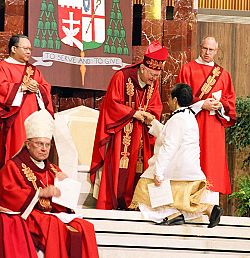
First of all, I wish to declare my gratitude to His Holiness, Pope Benedict XVI, for the confidence he has expressed in me by appointing me the eighth Archbishop of San Francisco. I am genuinely conscious of my own shortcomings and therefore of my need for your prayer and God’s light and strength and grace as I assume this office. I am grateful as well to Msgr. Leopoldo Girelli, representing the Apostolic Nunciature here today. I thank my friend, His Eminence, Justin Cardinal Rigali, for coming from Philadelphia to be here this afternoon. I thank my friend and classmate the Cardinal of the West, His Eminence, Cardinal Roger Mahony, for honoring us by being here today. He came all the way to The City from A City to the south of us! Next, I want to express my thanks to my two predecessor archbishops of San Francisco present here today, Archbishop John Quinn and Archbishop William Levada. Because of their gifts, their zeal, and their labors, and now because of their welcome and their encouragement, I dare to hope that, with God’s grace, the task before me can be accomplished. My thanks as well to the two Auxiliary Bishops of San Francisco, Bishop John Wester and Bishop Ignatius Wang, for their welcome, their support, and their assistance to me in this time of transition. I extend my special thanks to Bishop Wester for his superb service as Apostolic Administrator of the Archdiocese of San Francisco for nearly six months. I welcome and thank my brother bishops and archbishops who have come to celebrate with our archdiocese of San Francisco today. Together we seek to be a sign of unity among the successors of the apostles, with Peter as the head. Finally, my thanks to all of you here today from among the ranks of the priests, deacons, religious, and lay women and lay men who make up this local church of San Francisco, now in its 153rd year as an archdiocese. Three weeks ago today, Our Holy Father, Pope Benedict XVI, published the first encyclical letter of his pontificate, "Deus Caritas Est," "God Is Love." Today we are gathered around this altar to celebrate and pray for the beginning of a new archbishop’s service and leadership in San Francisco. We can have no better guide than the pope to help us to appreciate this afternoon’s readings, to understand who we are as the local Catholic Church in San Francisco, and to discern how we are called to live and work together. As the Holy Father’s letter guides us now, we can consider some implications for our life together as a local church. Pope Benedict begins his letter with the foundation of our faith in God, in the words of the first letter of the apostle John: "We have come to know and to believe in the love God has for us." We are not orphans in a cosmos but children of a loving, life-giving Father, who calls us to share his love for us with one another. Our Father has created – and loves – the whole human person, body and soul. The pope points out that the Old Testament prophets like Hosea and Ezekiel used images of human marital love to describe the relationship of God to Israel, his chosen people. In time this loving God took flesh in Jesus Christ, making himself visible. In Christ, Pope Benedict tells us, God himself goes in search of his stray sheep. Hundreds of years before, God had spoken through the prophet Jeremiah, in our first reading, rejecting the false shepherds of the flock of Israel who had betrayed them, and promising that he, the Lord himself, would be their shepherd and gather them together. Further, he had promised to send faithful shepherds who would protect and nourish his flock. In the fullness of time Jesus Christ declared himself to be the Good Shepherd, who lays down his life for his sheep. In our second reading, from the second letter of Peter, we hear the apostle exhorting those who shepherd in Christ’s name and power: Watch over the flock, willingly, generously, selflessly, serving as humble examples, not as arrogant lords. Especially in Jesus Christ God teaches us that the profoundest, richest love of all is about giving to, cherishing, and caring for others, not about getting more for oneself. In Jesus Christ, the pope tells us, God gives himself on the cross to raise us up and serve us. Moreover, God calls those who would follow his Son to become free and fulfilled through self-giving, not through getting: "The one who saves his life will lose it, while he who loses his life for my sake and the Gospel’s will save it." That is why we gather here around this table today, and every day, week after week. Eucharist draws us into this all-important self-giving act of Christ on Calvary. We become one with Christ and with one another when we receive the Body and Blood he gave for us. What’s more, this sacramental experience of oneness with Christ in his dying and rising is social in character. We American Catholics, steeped in individualism from our cradles, need always to be reminded that the most important experiences in life cannot be attained alone, because they are relationships: you can’t have a friendship all by yourself, you can’t get married alone, and you can’t be a disciple of Jesus Christ in splendid isolation. Pope Benedict reminds us that worship, Eucharistic communion, includes the reality of being loved and loving in return. These are the Holy Father’s own words: "A Eucharist that does not cross over into the concrete practice of love is intrinsically fragmented." Eucharist makes us one around the altar and one as a universal, Catholic Church. We are not called to factions, or even to congregationalism. We are Catholic in every parish, Catholic in every diocese, and Catholic throughout the world. The rich and challenging diversity of Catholics in this Archdiocese of San Francisco bears constant witness to his truth. Just last Friday
© Copyright 2024 The Diocese of Salt Lake City. All rights reserved.

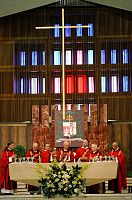
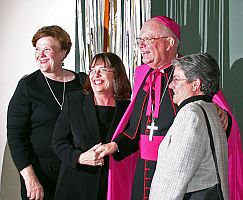
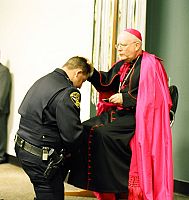
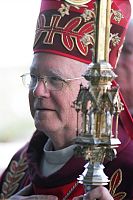
Stay Connected With Us